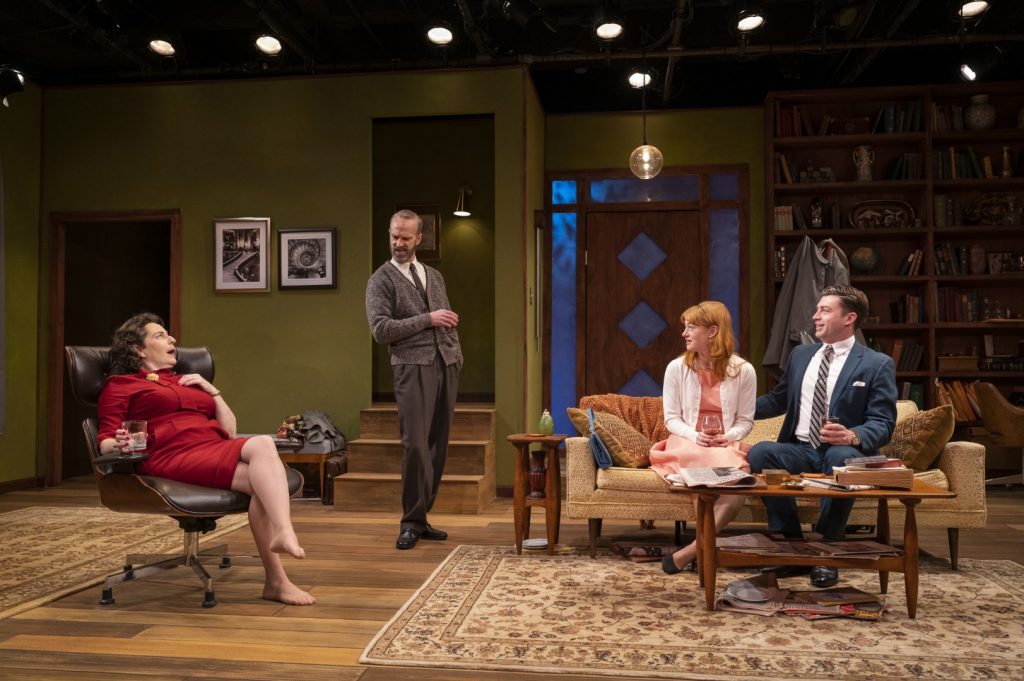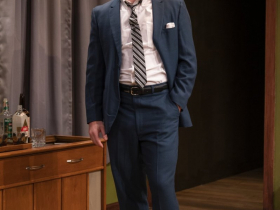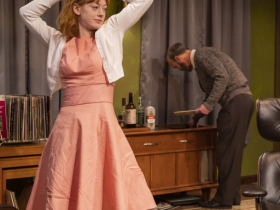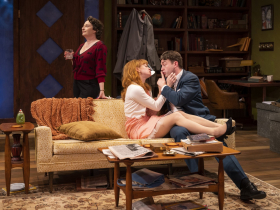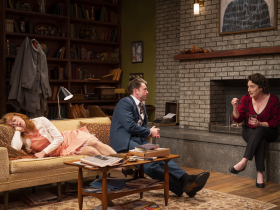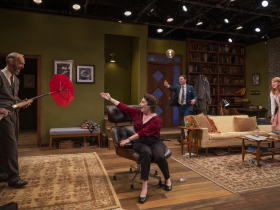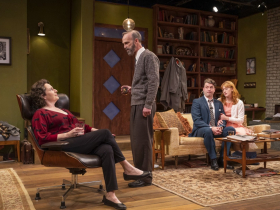Chamber Theatre Not Afraid of Virginia Woolf
Revival of Albee’s caustic classic is well acted, powerful and intriguing.
In a lovely program note explaining why the Milwaukee Chamber Theatre chose this play, artistic leader Brent Hazelton recalls how he first encountered Who’s Afraid of Virginia Woolf? as a beginning college theater student in 1995. His note led me to out-do him a bit in the memory department — but only because it relates to how highly I measure this production, running through Feb. 12 in the smaller studio stage of the Broadway Theatre Center.
In 1962 as a college student visiting New York, I saw the original cast – Arthur Hill as George and both Uta Hagen in the evening and Kate Reid in the matinee playing Martha. Yes, I saw it twice. Theater people knew then that Edward Albee had created a masterwork examining American domestic life and the slow death of the western notion of romance as George and Martha, in a drunken night at their college home, subject us and a new faculty couple to their bitter, funny and oddly mysterious games, including self-loathing.
This production, with an excellent one-room set by Jason Fassl and clever echo staging by Keira Fromm, deserves comparison with the original not because of similarities of performance, but because of topnotch professionalism and how different times, circumstances and actors add colors and perspectives, reminding us of how deep and dramatically complex was the original.
It was frightening in its day because of what it was saying about supposedly idyllic middle-class academic life, but it was also experimental theater in how it hinted at and revealed the myths people tell themselves to survive.
I felt in 1962 that Arthur Hill, while excellent, was keenly aware he was facing volcanoes in his Martha and had to underplay and mock to make his points. James Ridge‘s George also mocks but he is free today to reveal and even relish George’s intellectual power. He is not so much in a struggle to control Martha but to turn the entire company of actors into his playthings, giving George an almost Shakespearean power as a surgeon of human foibles – and the moral center of the play. It is a commanding performance, intriguingly balanced to match the artistic choices of his Martha.
As guest Nick, the faculty stud revealing more about his life and his wife, Honey, than he intended, Casey Hoekstra finds an intriguing actor’s way to boyishly grin his vulnerability and submerge and redirect his instinct for physical assault. The original Nick, the late George Grizzard, was a whirlwind of words whose cockiness made him loose-tongued, but he was not physically dominating against the lean Arthur Hill. Hoekstra is physically dominating so has to succumb to Ridge’s superior knowledge and verbal skill, requiring a different set of skills.
It’s different in the famous film with Richard Burton and Elizabeth Taylor, where director Mike Nichols could move the camera to disguise the transition moments. Onstage, Albee challenges every actor – there is no place to hide, except within characterizations, yet the plot needs moments of hiding to keep this drunken party going.
Albee as always is testing the best of actors to their limits. How do you disguise the technique needed while making the audience viscerally feel both laughter and pain? How do you exorcise (and exorcise is meant literally) the most basic of human deceptions, which is where this play is heading?
This production makes you appreciate Albee all over again and see new facets along the way. After 60 years the Milwaukee Chamber Theatre is treating Who’s Afraid of Virginia Woolf? as something it has long been – an outstanding example of classic theater.
Who’s Afraid of Virginia Woolf? Gallery
Dominique Paul Noth served for decades as film and drama critic, later senior editor for features at the Milwaukee Journal. You’ll find his blogs here and here.
If you think stories like this are important, become a member of Urban Milwaukee and help support real, independent journalism. Plus you get some cool added benefits.
Review
-
Eating Burmese in Bay View
 Dec 13th, 2025 by Cari Taylor-Carlson
Dec 13th, 2025 by Cari Taylor-Carlson
-
Casablanca Is a Milwaukee Success
 Nov 30th, 2025 by Cari Taylor-Carlson
Nov 30th, 2025 by Cari Taylor-Carlson
-
Oh, Those Witty 18th Century Brits
 Nov 24th, 2025 by Dominique Paul Noth
Nov 24th, 2025 by Dominique Paul Noth
Theater
-
Oh, Those Witty 18th Century Brits
 Nov 24th, 2025 by Dominique Paul Noth
Nov 24th, 2025 by Dominique Paul Noth
-
Skylight’s Holiday Show Is Lots of Fun
 Nov 16th, 2025 by Dominique Paul Noth
Nov 16th, 2025 by Dominique Paul Noth
-
Rep’s ‘Come From Away’ Is a Triumph
 Nov 10th, 2025 by Dominique Paul Noth
Nov 10th, 2025 by Dominique Paul Noth

